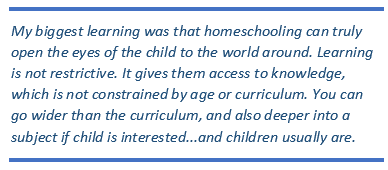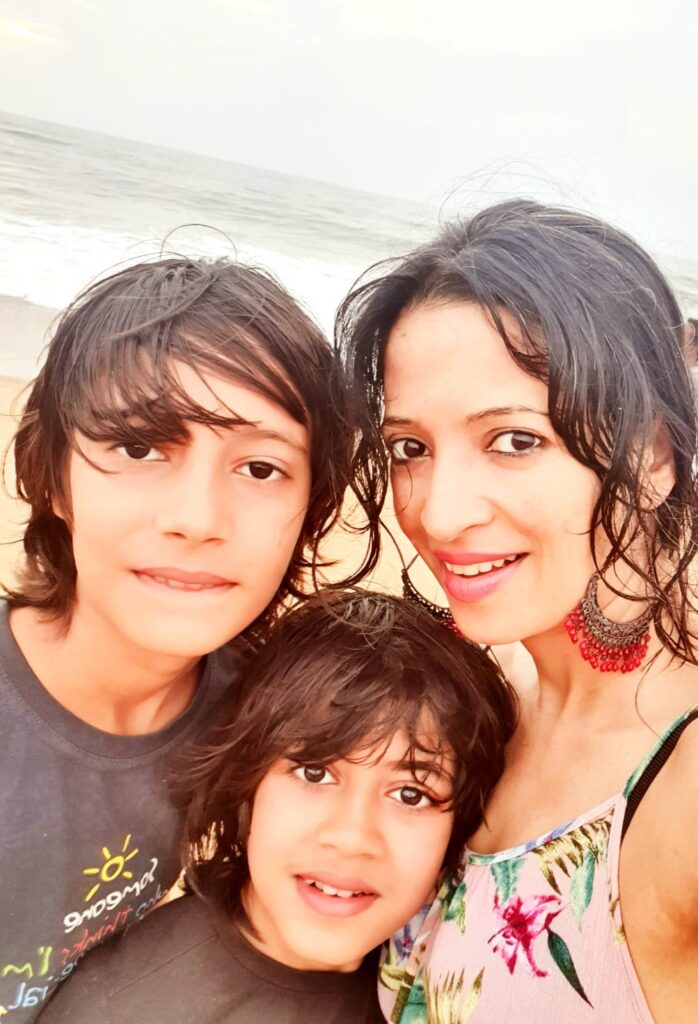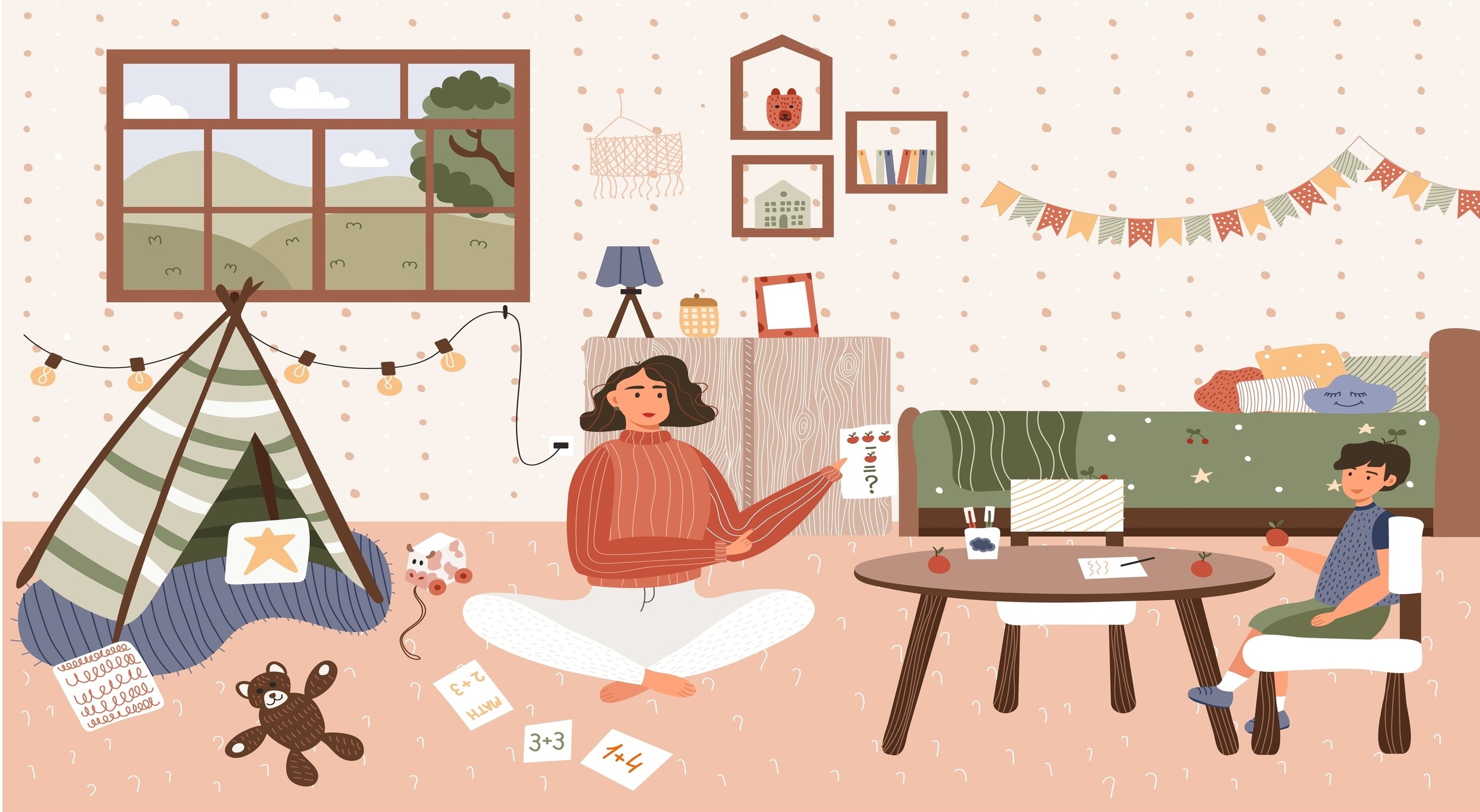In conversation with
Ekta Kumar | Mom of two sons 8 years and 10 years olds | Columnist, Speaker, Artist | IIMC, CA
Homeschooling is a unique experience, because it is personal and it is not limited by pre-defined school curriculum. Learning can be deep and wide as long as kids are curious to know more. It is also more efficient and effective as child sets the pace and parents know what works best with the kids.
As per HSLDA (Home School Legal Defense Association), estimated number of homeschooled kids in India is between 500-1000. It may be an underestimated figure, but reality is somewhere close. Although, homeschooling is legal in India, there is no framework or clear guidance. In 2010, the GoI clarified, "The Right of Children to Free and Compulsory Education (RTE) Act, 2009 wants every child to be in school, but if somebody decides not to send his/her children to school, we are not going to interfere". Essentially, the complete responsibilities for a homeschooled kid lie with parents, which is a blessing in disguise.
But, homeschooling is an unknown territory for most of the parents, as it is the path less travelled. The experiences of homeschooling parents can be helpful for all the parents. Ekta, who is a mom of two kids, finds homeschooling a fulfilling experience.

Ekta and her two sons, Adit (8) and Arav (11) are valiantly trying, slipping and succeeding in making their days together meaningful. She is a Chartered Accountant and an MBA from IIM Calcutta, who lives in Pune with her boys.

Q. Homeschooling is a concept rather than a curriculum. It is different and surely more demanding than just helping kids in their homework. How and when did you decide to do homeschooling for your kids?
Over the past few years, homeschooling has been a topic that would keep coming up on the dining table. But we never really had the courage to actually pull the kids out of school, and take full responsibility for their education. That was a scary thought. And so it remained a fantasy...until now. The pandemic and the lockdown was a god sent opportunity for us to make it real. And we grabbed it.
The decision wasn't very hard as we had never given our children access to gadgets, ipads, mobiles or tv, ever. I've always encouraged them to get bored, rather than look at a screen. So the option of online schooling was an absolute no. All that effort for ten long years, of no screen time, would go down the drain if my sons were to sit on a laptop all day. That was a big push factor.
And the second liberating factor was the complete lack of guilt. I did not have to worry about them missing out on social interactions and learnings from a community, because covid took that away in any case. Homeschool was a win win decision.
It has been over a year since we started, we have committed this academic year too...and given the amazing experience so far, I hope to be able to continue for a bit.
Q. The biggest challenge of homeschooling is the significant increase in the screen time for kid, and it is a big worry for all the parents. Please share more about your experience - The advantages and disadvantages of homeschooling.
The advantages of school are obvious. You cannot replicate that at home. They learn how to navigate the world, outside the safe cocoon of the home and family. At home they are always loved, safe and precious. But in school, they are exposed to all kinds of ups and downs, that they must learn to figure without our protection. It is easier to be independent.
If they raise hand to answer or ask a question, they may not get turn. That is life. However at home, there are only 2 students, and we are constantly pushing them to think and encouraging them to express what their thoughts, which is great - but I feel there is a learning that comes from not getting a turn, especially when you know the right answer. That doesn't happen at home.
School is more democratic, there are students who are better than you, and you learn to respect that, there are those who are weaker, and hopefully you learnt to empathsie. All of this is important. Schools are critical in building those social skills - of learning to fail, of learning to be not good enough, of learning not to get a chance, of learning to sometime doze off in the middle of the class with your eyes wide open, and getting away with it! None of this is what you do at home.
However, there is magic that happens at home. And that's what I want to share with you here today.
I'm not going to talk about the reduction of screen time - that's an obvious one. My biggest learning was that homeschooling can truly open the eyes of the child to the world around. Learning is not restrictive. It gives them access to knowledge, which is not constrained by age or curriculum.
You can go wider than the curriculum, and also deeper into a subject if child is interested...and children usually are. They are naturally curious. Why can't we introduce philosophy and is light made of particles or waves, and how to fry an egg.
Children are also impatient. In school if they learn faster than the others, they tend to get bored while others catch up, if they are slower than the others, they usually give up. But at home the child sets the pace, and you can figure what style works best...after all we know our children better than any teacher. So it is usually more efficient and effective.
Q. You can go wider and deeper, which makes the curriculum design the most challenging part of the homeschooling. There is absolutely no end to what you can add to the curriculum. How did you design curriculum for your kids?
We are following the set course defined by school, but to be honest, I am more excited about everything else that we are learning. It is our chance as parents to teach them about life, and explore the world together. There is no subject that is too big or complex or tough, feel free to touch on it all.
ART - For example we do an artist every month, this time it was Frida Kahlo, some might call it too dark for kids, but I think they must see it all, in their own way. We saw her work, her style and then analysed one painting, the one with thorns around her neck and why she painted and what do they think about it. Initially Arav and Adit both had very simple observations, more physical in nature. But, when I shared my analysis, their eyes kind of opened to all these new perspectives and they were so excited. Frida caught their interest when there was a her story attached to it, and how to express anger and pain through art. Painting need not always be about sunrise and flowers and legomen.
In the end we painted one of her famous paintings, (obviously all three were completely, and delightfully different). I just hope they will carry something from that class with them, even if they forget the details.
We have done several artists and various styles, and there are days I wonder if they remember anything, when suddenly out of the blue, one of them pointed out a Salvador Dali painting in a cartoon. To be able to make references of their learning at unexpected places. That was phenomenal for me, as a parent.
POETRY - There is not enough poetry in any curriculum! They were in IB board before this and they were literally doing one or two poems a year. Now we do one a week, and I'm loving it just as much as them - The Bazaars of Hyderabad by Sarojini Naidu to Tagore's 'Paper Boats' which can be so deep and yet playful, to some standard curriculum ones like Daffodils, Mcavity the mystery cat, some nonsensical fun ones like Jabberwocky. Vikram Seth's Frog and the Nightingale break their little hearts, others like the Walrus and the Carpentar makes them elocute with a flourish, Ozymandias can be combined with history, and then there is 'make your own Haiku' and make your own version of some other poem...and so on and on.
There is so much that a single poem can do. IB board focus on logic and analysis, but not so much on memory. But learning to remember is important too. Memorizing poetry is different from mind numbing rote learning of say the capitals of the countries. Reciting lines from a poem teaches us how to speak from the heart, it combines a little analysis, a little philosophy, a little imagination, and a little performance.
SCIENCE - can be so much fun. And it doesn't have to be compartmentalised into subjects and chapters. It creeps into everything. We throw seeds in the garden, watch it grow, pluck the flowers, collect leaves and talk about the earth, and the stamen, and pollution, and the layers of the atmosphere, and the water-cycle, and the monsoon, and the earth's rotation and the seasons and so on and on... It is all linked in any case.
When we were learning about our body, we learnt them all, one at a time, the digestive system, the circulatory system, the respiratory system, the endocrine, the urinary, the skeletal...nothing is too much, as long as it's a story we are telling our children. They are curious, and the world for them is interesting when it is personal. When you grow a flower, and then examine its anther and filament... or when you have to pee, why and what lies inside. They want to know it all.
Friction via football, and light waves through a prism, and inclined plane via yoga - that's the general idea.
HISTORY & GEOGRAPHY - I wish someone had told me that history and geography are not two different subjects in school. They go together, hand in hand. History is a story about our past, and who doesn't like listening to a story. And when we do History, we do it with a world map spread out on the floor. So they can literally see Alexandar the great advancing into India, the Roman empire creeping over Europe, trace the Silk route and the flow of gunpowder and pepper, the spread of Ashokas empire, and why the Strait of Gibraltar was important for world trade.
Q. Wow! When kids get to learn this way, they will always look for more. It must be taking a lot of effort and time to plan, design and teach. How much time do you need to spend for kid's study?
It sounds like a lot, but it is very doable. Routine is the key. Once a schedule is set up, it flows smoothly. We have a timetable going. I spend around an hour and a half, sometimes two. The heavier subjects are pre lunch, and the lighter ones where they don't need me, like music, French, coding, art, essay writing, comprehension is in the afternoon. Hindi is nani time, it's a half hour class twice a week with their grandmother, both sides love it. And we end in the afternoon, reading their storybooks, in bed  (advantages of homeschool again!)
(advantages of homeschool again!)
Q. Your insights will be really helpful for the parents, who are exploring this option. Any message, that you would like to share with them?
As parents we share something fundamental - we love our children and we want to prepare them with all that we have, so that they can find their place in the world, and be happy. Homeschool allows us to do that. When my boys were attending school there was never enough time together, to ask and answer and talk about 'cabbages and kings'.
I don't have answers for everyone as we are all different individuals, our children are different and so our circumstance. Each of us need to figure how to make this work best for us as a family. But the only thing I want to say is that if you had been thinking of homeschooling, or are inclined that way... this is the time to do it. With schools shut, they are missing out on the whole social advantage thing in any case, then might as well give them a little from the other side. Try it, and see if it works for you.
Read http://www.myschoolz.com/blog/what-is-homeschooling-advantages-challenges-boards-and-curriculum for more details about homeschooling curriculum and more.
